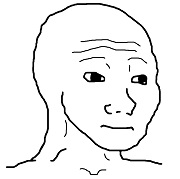History
Peaknik subculture
The term "doomer" was reported in 2008 as being used in early internet peaknik communities, as on internet forums where members discussed the theorized point in time when oil extraction would stop due to lack of resources, followed by societal collapse. Doomers of the mid-aughts subscribed to various ideas on how to face this impending collapse, including doomsday prepping, as well as more contemporary feelings of resignation and defeat. [5]
Canadian self-identified doomer Paul Chefurka hosted a website where he encouraged his readers to eat lower on the food chain, modify their homes for the apocalypse, and to consider not having children. [5] Not all "peakniks" subscribed to a fatalist outlook. U.S. Army Ranger Chris Lisle, when writing recommendations on how to survive the societal collapse, suggested that fellow doomers "adopt a positive attitude," because, as he put it, "Hard times don't last, hard people do." [5]
Internet meme

By 2018, 4chan users had begun creating Wojak caricatures with the -oomer suffix, derived from "boomer", to mock various groups online. One of these caricatures was "Doomers", 20-somethings who had "simply stopped trying". [6] The meme first appeared on 4chan's /r9k/ board in September 2018. [6] The image typically depicts the Wojak character in dark clothing, including a dark beanie, smoking a cigarette. "Doomer" themed playlists, featuring this wojak along with slowed down music edits (often involving post-punk or rock) reached popularity on YouTube, especially during the Covid-19 lockdowns. The archetype often embodies nihilism and despair, with a belief in the incipient end of the world to causes ranging from climate apocalypse to peak oil to (more locally) opioid addiction. [7] Kaitlyn Tiffany writes in The Atlantic that the doomer meme depicts young men who "are no longer pursuing friendships or relationships, and get no joy from anything because they know that the world is coming to an end." [6]
A related meme format, "doomer girl", began appearing on 4chan in January 2020, and it soon moved to other online communities, including Reddit, Twitter, and Tumblr, often by women claiming it from its 4chan origins. [6] This format is described by The Atlantic as "a quickly sketched cartoon woman with black hair, black clothes, and sad eyes ringed with red makeup". The doomer girl character often appears in image macros interacting with the original doomer character. [6] [8] The format is often compared to rage comics. [8]
In media
The term "doomer" was popularized in commentary surrounding Jonathan Franzen's 2019 essay in The New Yorker titled "What if We Stopped Pretending?". The piece made an argument against the possibility of averting climatic catastrophe. In addition to popularizing the term among general audiences, Franzen's piece was highly popular among online Doomer communities, including the Facebook groups Near Term Human Extinction Support Group and Abrupt Climate Change. [9]
The BBC describes sustainability professor Jem Bendell's self-published paper Deep Adaptation: A Map for Navigating Climate Tragedy as "the closest thing to a manifesto for a generation of self-described 'climate doomers'". [10] As of March 2020, the paper had been downloaded more than a half-million times. In it, Bendell claims there is no chance to avert a near-term breakdown in human civilization, but that people must instead prepare to live with and prepare for the effects of climate change. [10]
Climate scientist Michael E. Mann described Bendell's paper as "pseudo-scientific nonsense", saying Bendell's "doomist framing" was a "dangerous new strain of crypto-denialism" that would "lead us down the very same path of inaction as outright climate change denial". [10] An essay published on OpenDemocracy argues that the paper is an example of "climate doomism" that "relies heavily on misinterpreted climate science". [11]
Michael Mann has also listed David Wallace Wells's framing of the climate crisis, which he presents in "The Uninhabitable Earth" and The Uninhabitable Earth: Life After Warming , as being among "the prominent doomist narratives." [12]
Uncivilization: The Dark Mountain Manifesto , published in 2009 by Paul Kingsnorth and Dougald Hine to signal the beginning of the artists' group the Dark Mountain Project, critiques the idea of progress. According to The New York Times , critics called Kingsnorth and his sympathizers "doomers", "nihilists", and "crazy collapsitarians". [13]
Kate Knibbs, writing in Wired , described the development of a popular and growing strain of "doomer" climate fiction, in contrast to the typically optimistic undertones of the genre. Amy Brady, a climate fiction columnist for the Chicago Review of Books, says the genre has moved from future scenarios to near-past and present stories. [14]
Recently, it was discovered that "doom" was co-opted by some of the industries who seek to prevent climate action. In "Discourses of climate delay" presented by Lamb, et al in the journal Global Sustainability[ citation needed ], the category of "Surrender" was elicited from study of publications on delay tactics used by industry public relations. "Doomer" or "Doomism" is one mechanism to sow doubt about the feasibility of mitigation of climate action with the intent to counter it. Surveys such as those performed by Yale Climate 360 have shown that in reality, the number of respondents who endorse inaction due to fear or such doom ("Fatalism" is exceptionally minor, varying in the single digit percentages . Yet the malicious messaging about "doomism" promoted by the oil and gas industries appears to have done it's job convincing major climate science communicators that "doomism" is a real threat. Social science has debunked this theory since around 2019, where many studies show that humans react differently to different messaging, and for most the level of concern expressed should match the level of danger. [15] Health science also informs that affect is powerful in motivating change in behavior. [16] Further investigations have not only revealed these oil and gas industry PR tactics, but that they have infiltrated many many top university climate programs. Congressional hearings on April 30, 2024 reveal the PR pushed by these oil companies through the climate schools in conjunction with major media organizations. Discourses of delay are prominent in the documentations revealed.










